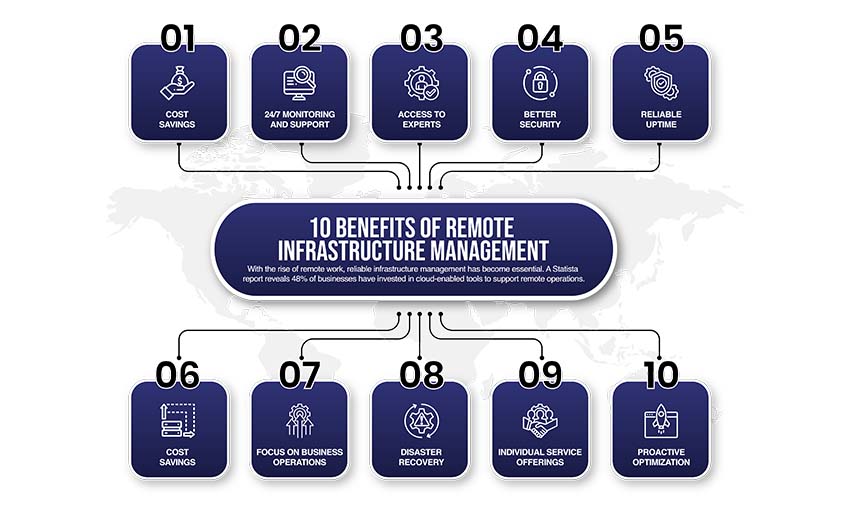
With more and more companies adopting the work-from-home paradigm, remote infrastructure management has quickly emerged as a crucial component for companies looking to ensure smooth operations.
Business owners are more aware than ever of the need for reliable and robust infrastructure management.
Indeed, according to a recent Statista report, 48% of businesses have already made investments in cloud-enabled tools and solutions to help their remote workers.
Cost Savings
Significantly lower operating costs are one of the most alluring advantages of RIM. By outsourcing IT infrastructure management, companies can save money on things like physical space, power, and hiring a qualified in-house IT staff. This cost-effectiveness enables companies to more strategically allocate resources, concentrating on core skills and expansion plans.
24/7 Monitoring and Support
Because IT systems might experience problems at any time, constant monitoring is crucial. IT settings are continuously monitored by RIM service providers, guaranteeing that any irregularities are found and dealt with right away. This proactive strategy keeps corporate operations running smoothly and reduces downtime.
Access to Experts
By collaborating with remote infrastructure management companies, businesses may have access to the newest technology and a network of professionals. By keeping up with new developments in technologies and trends, these providers guarantee that the managed infrastructure is safe and up to date. Improved IT system performance and dependability are the results of this knowledge.
Better Security
Keeping strong security measures in place is crucial given the rise in cyberthreats. Continuous vulnerability monitoring is part of RIM services, which guarantee that security procedures are current and efficient. In order to reduce the risks associated with non-compliance, RIM providers also assist firms in adhering to industry norms and laws.
Established in 1982, GCG provided cutting-edge solutions related to digital transformation, IT services, audio-visual systems, and managed print services to support organizations in their transformation journey. (CTA)
Reliable Uptime
To ensure unmatched uptime, remote infrastructure management companies use top-notch hardware and managerial know-how. They may stop possible problems before they become serious by proactively monitoring and maintaining IT systems, guaranteeing the availability and dependability of vital business applications.
Scalability
Businesses’ IT requirements change as they expand. The ability to scale services up or down in accordance with organizational needs is provided by RIM. Without requiring large capital expenditures, this flexibility guarantees that IT infrastructure satisfies present business needs.
Focus on Business Operations
External specialists can handle IT infrastructure management, freeing up internal staff to focus on key projects and essential business operations. In addition to increasing productivity, this delegating promotes creativity and competitive advantage.
Disaster Recovery
Business continuity planning is greatly aided by remote infrastructure management services. By providing firms with redundant systems and strong disaster recovery solutions, RIM providers guarantee that they can swiftly recover from interruptions while preserving operational resilience.
Individual Service Offerings
Every company has different IT needs. Whether it’s server management, network maintenance, or on-site support, RIM suppliers provide customized services that meet certain corporate needs. The best possible performance and value are guaranteed by this customization.
Proactive Optimization
In order to pinpoint areas that require improvement, RIM providers frequently carry out thorough infrastructure studies. They assist businesses in improving performance, cutting expenses, and maintaining an advantage in a competitive market by optimizing IT environments.
FAQs
What is Remote Infrastructure Management (RIM)?
RIM involves monitoring and managing a company’s IT infrastructure remotely, including servers, networks, and workstations, to ensure optimal performance and security.
How does RIM contribute to cost savings?
By outsourcing IT management, businesses can reduce expenses related to hiring, training, and retaining in-house IT staff. Additionally, RIM providers often utilize automation to minimize manual interventions, further lowering operational costs.
Can RIM improve system uptime and reliability?
Yes, RIM offers 24/7 monitoring and support, enabling proactive identification and resolution of potential issues before they lead to downtime, thus ensuring continuous system availability.
How does RIM enhance security and compliance?
RIM providers implement robust security measures, including regular updates and patch management, to protect against cyber threats. They also ensure compliance with industry standards and regulations, safeguarding sensitive data.
What scalability advantages does RIM offer?
RIM services can easily scale to accommodate business growth or changes, allowing companies to adjust their IT resources without significant investments in new infrastructure.
Does RIM support remote work initiatives?
Absolutely, RIM facilitates remote work by managing and securing the necessary IT infrastructure, ensuring employees have reliable access to the tools and data they need from any location.
How does RIM impact business continuity and disaster recovery?
RIM includes disaster recovery planning and data backup services, which help businesses quickly recover from disruptions, maintaining continuity and minimizing potential losses.
Conclusion
In conclusion, by offering cost savings, professional support, improved security, and operational efficiency, remote infrastructure management gives a strategic edge. Businesses may concentrate on their primary goals while making sure that their IT infrastructure is reliable, secure, and flexible enough to meet evolving demands by utilizing RIM services.




